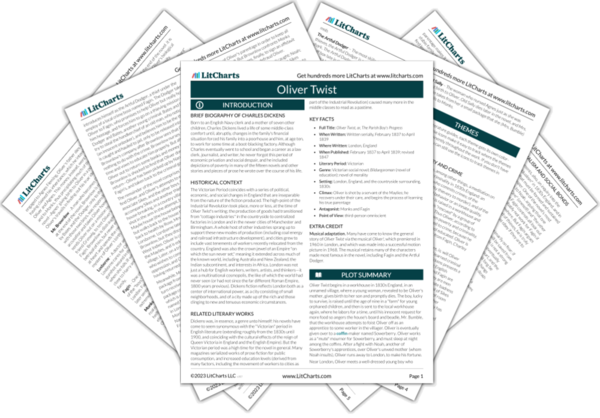Summary
Analysis
Nancy enters Rose's room at the hotel, where Rose apologizes for Nancy's difficulty in coming to see her. Nancy, for her part, apologizes for her low social status, remarking that, "if there were more like you [Rose], there would be fewer like me." Nancy admits that it was she who dragged Oliver back to Fagin's, when he was carrying books to the bookseller. Although Rose is shocked by this information, Nancy says she only did it because of her circumstances—she feels loyal to Fagin and Sikes because they helped to raise her, even if they initiated her into a life of crime. Rose seems to understand this, and says she pities Nancy.
The relationship between Rose and Nancy is an intriguing and complex one. One can imagine that Nancy might have turned out a bit more like Rose, had she simply been raised in more pleasant circumstances. This is one of Dickens' subtle jabs at the impermeability of classes in England at the time—it was very difficult for someone like Nancy to receive a good education, or a good job, without the social connections possessed by someone like Rose.
Themes
Literary Devices
Nancy reveals to Rose information she has heard from conversations between Fagin and Monks (whom Rose does not know). Nancy says that Monks has his own reasons for wanting to find Oliver, which he has not revealed to Fagin; Monks saw Oliver on the street on the day when the Dodger and Bates robbed Brownlow (by coincidence), and from this time on Monks promised Fagin money if Fagin could get Oliver back, alive, and if Fagin could then make Oliver a criminal. Monks, again, had his reasons for wanting these things, but did not share them with Fagin.
Nancy hears a large amount of Monks' motivation, but not all of it. She knows that Monks and Oliver are half-brothers, and she perceives that Monks has a vested interest in keeping Oliver from discovering that very fact. But Nancy does not seem to know, or to have heard, the extent to which Oliver stands to benefit from this connection with Monks, via the inheritance Oliver is to receive from his deceased father Edwin.
Themes
Nancy reveals the content of tonight's conversation between Monks and Fagin to Rose: Monks said that the only proof of Oliver's family ties lies at the bottom of the river Thames, and that the woman who once had this proof (Sally) is "in her coffin." Further, Monks reveals that Oliver is of high birth, and that if he finds out about this high birth, he might be able to use it against Monks. Monks, lastly, told Fagin that Monks and Oliver are brothers.
Bumble and his wife might have thought that their actions took place under the cover of darkness, but once Nancy overhears Monks discussing the purchase of the package, Bumble and Mrs. Bumble are irrevocably part of the narrative. And when Monks is captured, the Bumbles will also suffer.
Themes
This last piece of information is most shocking to Rose. Monks also told Fagin that the Maylies would die to know their relationship to Oliver, but that they would never learn the nature of this relationship. Rose begs, on hearing this, that Nancy remain with them, in the hotel, and be spirited away to safety. But Nancy insists that she will go back to Fagin, Sikes, and the boys. Rose says that she believes the truth of what Nancy says, because Nancy has risked her life to tell it to her.
Another instance of Nancy's loyalty. Dickens seems to be of two minds regarding this loyalty. On the one hand, Nancy's courage is notable, and she is far stronger, as it turns out, than the male criminals Fagin and Sikes, in her determination and moral fortitude. But Dickens also clearly believes that Nancy has cast her lot with the wrong side—that of the criminals.
Themes
Get the entire Oliver Twist LitChart as a printable PDF.

Rose begs, again, that Nancy stay with them, but Nancy repeats that she is loyal to the scoundrels she lives with, that it is too late for her, that she cannot be redeemed. Nancy tells Rose, further, that she can be met on London bridge every Sunday night between eleven and twelve to talk with Rose and whomever Rose brings along. Nancy refuses money from Rose but takes her blessings, and saying that she (Nancy) has "no roof but a coffin-lid," heads out again into the night, leaving Rose shocked by the evening's revelations.
An important use of coffin symbolism. The coffin, later in the novel, will come to symbolize also Agnes Fleming, Oliver's mother, who was similarly good-natured, like Nancy, but who succumbed, like Nancy, to moral temptation in agreeing to have a liaison with Edwin before marriage. Nancy has also made decisions that push her into a life of crime from which she cannot escape.
Themes
Literary Devices












